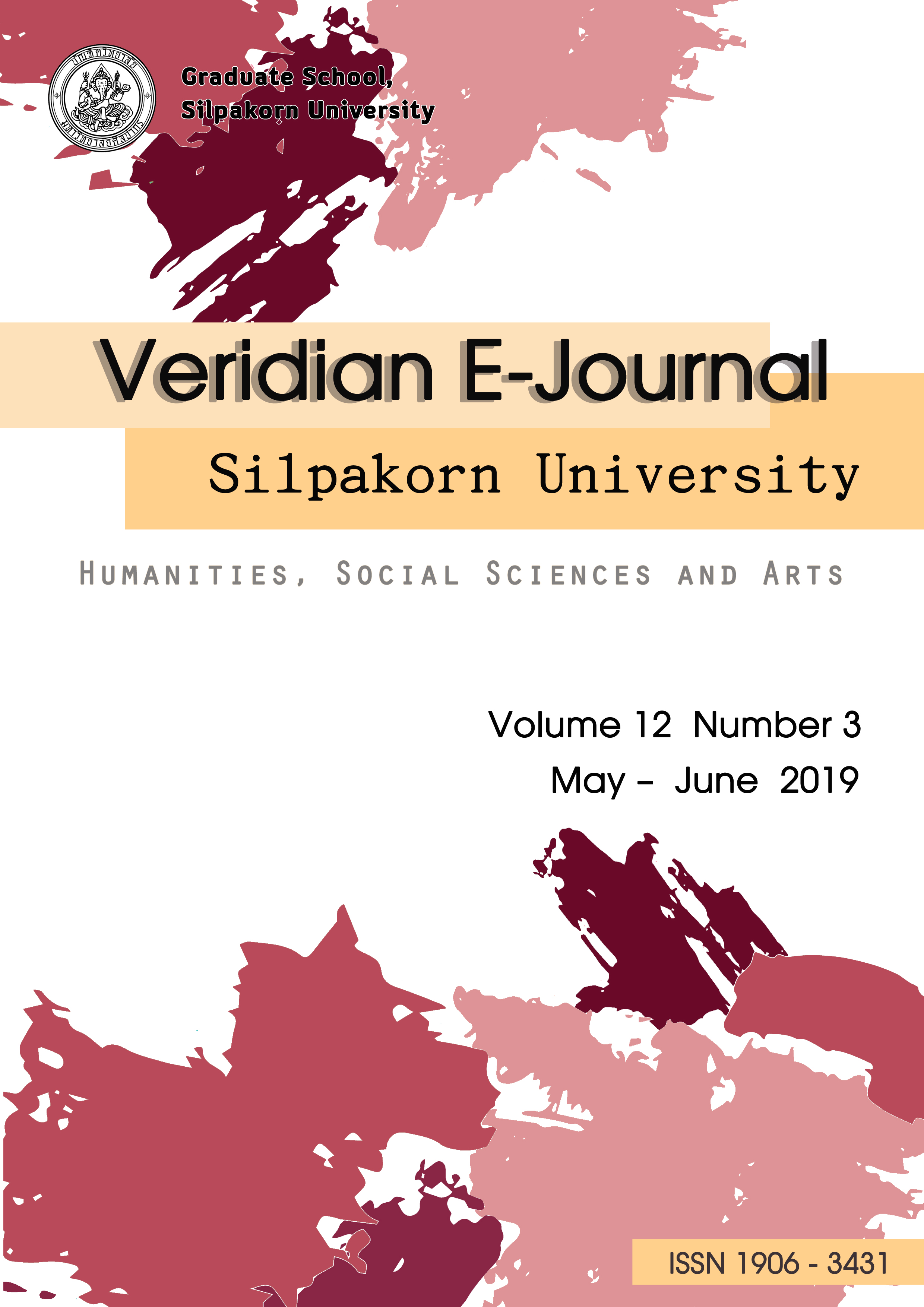Essential Skills for Thailand 4.0: The Importance of Education Corresponded to Employment Scenarios, and Building Self-Competent Immunity Pertaining to Technological Disruptions
Main Article Content
บทคัดย่อ
Inspired by the importance of realizing Thailand 4.0 policy concerning skills required for job opportunities and fields of studies relevant to technological disruptions, and what to prepare in order to stay relevant and competitive in the ever challenging and increasing competition in the jobs market demands, the academic article has been written with an aim to provide a gainful insights and useful guidance for students, educators, public and private institutions, and business people at large. Furthermore, the article sheds light on the employment landscape and explores scenarios in both macro and micro levels related to fields of study corresponded to the future employment opportunities for students, job seekers and concerned stakeholders to strongly consider before making a career decision whether it be the suitable enrollment field with demand in the jobs market and/or lines of jobs that are/will be needed in the market going forward. Additionally, the article identifies both hard and soft skills required to compete as well as fields of work that will be in demand pertain to Thailand 4.0 model as well as ways to prepare and curb with potential of digital transformation, robotics and machines automation to replace humans, specifically monotonous tasks and functions as the digital technology has continued to evolve. For students and job seekers whose expertise and capabilities are not technologically inclined to suit Thailand 4.0 and S-Curve’s requirements, those who graduated in social studies or related disciplines in particular, the windows of opportunities lie in people-oriented, customer interactions or customer service aspects along with competent communication in foreign language (s) skills (ideally, TOEIC exam capacity of minimum 550 required by many leading companies) though complemented of critical/strategically thinking, problem solving, and importantly human skills. That said, with enhanced capabilities to apply human emotions, intuition, and be able to understand and deal with people and customers’ feelings and needs, having empathy towards others, and able to apply all these attributes to handle and resolve emotional/attitude-linked issues and matters, thereby are considered as a competitive advantage, serve as immunity, and without a doubt, are irreplaceable by intelligent machines.
Article Details
เอกสารอ้างอิง
Adecco‘s Knowledge Center/labor Market Survey (2018). Top Three Most Promising Jobs 2019- 2025. https://adecco.co.th/en/knowledge-center/detail/top-3-career-2025. Searched on January 9, 2019.https://www.oxfordmartin.ox.ac.uk/publications/view/2092
Adecco‘s Knowledge Center/Personnel Development Survey (2018). Thailand’s Ten Must-Have Skills. https://adecco.co.th/en/knowledge-center/detail/10-skills-thailand-2022. Searched on January 9, 2019.https://www3.weforum.org/docs/WEF_Future_of_Jobs_2018.pdf.
Apisitniran L. (2019). How to meet changing labor demand. https://www.bangkokpost.com/business/news. Retrieved on January 26, 2019.
Apisitniran L. (2019). Automation, AI pressure factory labor Market: Institute Predicts More Jobless in 2019. https://www.bangkokpost.com/business/news/1630714/automation-ai-pressure-factory-labour-market. Retrieved on February 18, 2019.
Asia News Network Hanoi (2018). New technology could mean 28 million jobs being lost in the ASEAN region. https://www.nationmultimedia.com/detail/breakingnews/30354359. Retrieved on December 21, 2018.
Bangkok Post’s Business reporters (2017). Labor risks going under amid AI wave. https://www.bangkokpost.com/tech/local-news/1367471/labour-risks-going-under-amid-ai-wave. Retrieved on January 2, 2019.
Baxter W. (2017). Thailand 4.0 and the Future of Work in the Kingdom. https//wwwiloorgwcmsp5groupspublicdgreports/dcomm/documents/meetingdocument/wcms_549062.pdf. Retrieved on January 27, 2019.
CISCO/Oxford Economics (2018). The impact of AI on workers in ASEAN’s six largest economies. https://www.cisco.com/c/dam/global/en_sg/assets/csr/pdf/technology-and-the-future-of-asean-jobs.pdf. Retrieved on December 20, 2018.
Charuvastra T. (2017). Machines Coming to Take Millions of Thai Jobs. https://www.khaosodenglish.com/news/business/2017/05/31/machines-coming-take-millions-thai-jobs-report/. Retrieved on December 25, 2018.
Chang J., Huynh P. (2016). ASEAN in Transformation: International Labor Organization. ASEAN in Transformation.https://www.ilo.org/wcmsp5/groups/public/ed_dialogue/act_emp/documents/publication/wcms_579554.pdf. ISBN 978-92-2-130965-9 P. 34. Retrieved on January 28, 2019.
Chin S. (2018). AI Threatens ASEAN Jobs. https://theaseanpost.com/article/ai-threatens-asean- jobs. Retrieved on January 6, 2019.
Crabtree J. (2018). Robots threaten Asian jobs: Automation risks hitting the region's low-skill industrial posts. https://asia.nikkei.com/Opinion/Robots-threaten-Asian-jobs2. Retrieved on December 22, 2018.
CT Asia Robotics (2019). Dinsow/the Service Robots. www.dinsow.com/index.html. Retrieved on February 10, 2019.
Employment Disruption by Robotics (2018). www.Bangkokbiznews.com, a newspaper printed copy no. 11029, December 3, 2018. p 4.
Frey & Osborne (2013). The Future of Employment. www.oxfordmartin.ox.ac.uk/downloads/academic/The_Future_of_Employment.pdf. Retrieved on January 15, 2019.
Gnanasagaran A. (2018). Thailand begins push for automation and robotics. The ASEAN Post Line. https://theaseanpost.com/article/thailand-begins-push-automation-and-robotics. Retrieved on January 14, 2019.
Government Public Relations Department. Developing the Country toward Thailand 4.0. https://thailand.prd.go.th/ewt_news.php?nid=4498&filename=index. Retrieved on January 27, 2019.
Guthrie-Jensen Consultants. (2018). A New Age of Future Jobs and 10 Skills You Will Need to Master in Order to Succeed by 2020. https://www.supplychain247.com/article/10_skills_you_need_to_master_in_2020. Retrieved on January 15, 2019.
Hansen M. (2018. Higher education needs dusting off for the 21st century. https://www.weforum.org/agenda/2018/03/make-higher-education-skills-relevant-for-students/. Searched on February 13, 2019.
Hicks W. (2019). Working the future hustle. https:// www bangkokpost.com/business/news/1603703706#cxrecs_s. Retrieved on January 1, 2019.
Jantapong S. (2018). MPG Economic Review: Skills Mismatch and the Challenge of Education 4.0. https://www.bot.or.th/Thai/ResearchAndPublications/DocLib_/Article_24Jul2018.pdf. p.1.
JobThai (2018). Skills Needed to Compete in Artificial Intelligence Era. https://www.jobthai.com/REACH/career-tips/6. Retrieved on January 8, 2019.
Jones C. and Pimdee P. (2017). Innovative Ideas: Thailand 4.0 (the fourth industrial revolution). https://doi.org/10.29139/aijss.20170101. p. 7.
Karnjanakantikul S. (2019). Occupations at Risk. https://www.manpowerthailand.com/tris/content/detail/5829--on. Aired on TNN 16 channel. Retrieved on March 16, 2019.
Modgil S. (2018). What will be the impact of AI on workers in 6 ASEAN countries?https://www.peoplemattersglobal.com/news/automation-jobs/what-will-be-the-impact-of-ai-on-workers-in-6-asean-countries-19258. Retrieved on December 22, 2018.
Sasiwuttiwat S. (2018). TDRI: Reorienting the Thai Economy to Prepare for the Age of Technological Disruptions. https://tdri.or.th/en/2018/05/annual-con-2018-news/. Retrieved on March 3, 2019.
Srimalee S. (2019). Turnaround Expert Spins into Action. https://www.nationmultimedia.com/detail/Corporate/30362519. Retrieved on January 19, 2019.
Thansettakij Multimedia (2018). Jobs in Demand in 2019. https://www.thansettakij.com/content/365800./Business. Retrieved on February 2, 2019.
Thansettakij Multimedia (2019). The Effects of AI Technology to Businesses. https://www.thansettakij.com/content/369140. Retrieved on February 9, 2019.
Theparat C. (2019). EEC head: Target sectors need 1m-plus workers. https://www.bangkokpost.com/business/news/1629970/eec-head-target-sectors-need-1m-plus-workers. Retrieved on February 18, 2019.
Wike R. (2018). Many fear robots, computers will eliminate jobs, increase inequality. https://www.pewglobal.org/2018/09/13/in-advanced-and-emerging-economies-alike-worries-about-job-automation/. Retrieved on March 24, 2019.
Wongprasong T. (2018). Equitable Education Fund News: Professional Careers, Opportunities, and Income Inequality., https://www.eef.or.th/181218-2/. Retrieved on February 16, 2019.

